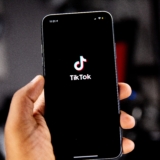Calls to Ban Kids from Social Media Gain Traction Amidst TikTok Ban Bill
In a digital age where screens pervade every aspect of daily life, a growing chorus of voices is advocating for a radical shift in how children interact with technology. A recent poll reveals that a majority of Americans support banning kids from social media and restricting smartphone usage in schools, reflecting mounting concerns over the impact of digital platforms on youth development and well-being.
The findings come at a pivotal moment, with the House of Representatives recently passing a bill aimed at banning the popular video-sharing app TikTok amidst escalating concerns over data privacy and national security. The confluence of these developments underscores a broader reckoning with the role of technology in shaping the lives of the next generation.
According to the poll, conducted by a leading research firm, nearly 60% of respondents expressed support for prohibiting children under the age of 13 from using social media platforms, citing concerns about online predators, cyberbullying, and the addictive nature of digital engagement. Additionally, a significant majority endorsed the idea of restricting smartphone usage in schools, citing concerns about distraction, academic performance, and the erosion of social skills.
These sentiments reflect a growing awareness of the unique challenges posed by the digital landscape, where children are exposed to a barrage of information, images, and interactions from a young age. With smartphones becoming ubiquitous in classrooms and social media platforms serving as virtual playgrounds, parents, educators, and policymakers are grappling with how to navigate the digital divide and safeguard children’s well-being.
The push to ban TikTok, in particular, has galvanized bipartisan support in Congress, with lawmakers raising alarm bells over the app’s ties to the Chinese government and its potential to compromise user data. The bill, which now heads to the Senate for consideration, underscores the growing scrutiny of tech giants and the need for robust regulations to protect national security and privacy in an increasingly interconnected world.
However, critics argue that blanket bans and restrictions may not address the root causes of digital addiction and online harm. Instead, they advocate for comprehensive education initiatives, parental controls, and digital literacy programs to empower children to navigate the digital landscape safely and responsibly.
As the debate unfolds, one thing is clear: the digital revolution has irrevocably transformed the way we live, learn, and connect. Yet, as we harness the power of technology to drive progress and innovation, we must also confront its darker side and ensure that the benefits of the digital age are shared equitably and responsibly.
In charting a path forward, we must strike a delicate balance between harnessing the transformative potential of technology and safeguarding the well-being of future generations. By fostering a culture of digital citizenship, empathy, and critical thinking, we can empower children to navigate the complexities of the digital world with confidence and resilience.






